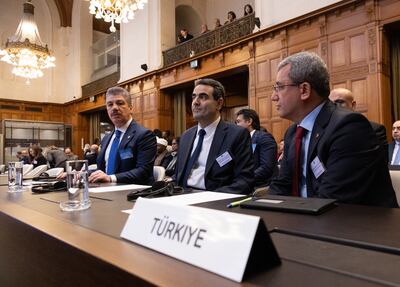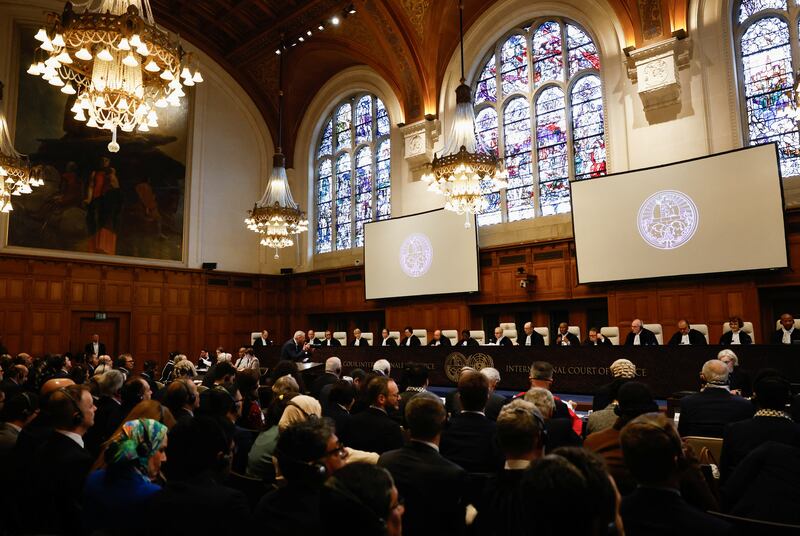Live updates: Follow the latest news on Israel-Gaza
The impunity enjoyed by Israel despite its 57-year illegal occupation of Palestinian territories is a threat to international peace and stability, an Arab League spokesman told the International Court of Justice on Monday.
Speaking on behalf of Arab League Secretary General Ahmed Aboul Gheit, the organisation's representative in Brussels, Abdel Hakim Al Rifai, said he trusted that the court in The Hague would "confirm the illegality of this occupation".
"This prolonged occupation is an affront to international justice," Mr Al Rifai said as hearings about the legality of the occupation entered their last day. "The failure to bring it to an end has led to the current horrors perpetrated against the Palestinian people amounting to genocide.
"The insistence on placing Israel above the law though the politicisation of accountability and adopting double standards in the application of justice is a direct threat to international peace and stability."
Mr Al Rifai said Palestinians had been victims of "ethnic cleansing, war crimes, crimes against humanity, displacement of populations, imprisonment ... behind illegal segregation walls, [and] expansions of illegal [Israeli] settlements."
Israel rejects such accusations, including claims of genocide.
The right to self-determination is for Palestinians to claim and not for Israel to bestow, said Ralph Wilde, associate professor of law at University College London.
"The Palestinian people have been denied the exercise of their legal right to self-determination through the more than century long violent, colonial racist effort to establish a nation state exclusively for the Jewish people in the land of mandatory Palestine," he said, speaking on behalf of the Arab League.
A record number of 52 countries and international organisations, including the Arab League, made statements during the hearings that arose from requests for clarification made by the UN Security Council to the ICJ in 2022 about the Israeli occupation of Palestinian territories, including East Jerusalem, since 1967.
Most were critical of Israel.
"The ruled base international system is coming to a point of collapse because of the injustices inflicted on the Palestinian people for decades," Turkey's deputy foreign minister Ahmet Yildiz said.
In an apparent reference to Palestinian militant group Hamas, Mr Yildiz told the court: “The conflict is not about a certain Palestinian faction or group. The conflict dates back to an earlier century.”
Hamas-led attacks on Israel on October 7 that killed about 1,200 people triggered an Israeli military response on Gaza that has killed more than 29,700.
"The real obstacle to peace is obvious: the deepening occupation by Israel of the Palestinian territories, including East Jerusalem, and the failure to implement the two-state vision of Israelis and Palestinians living side-by-side," said Mr Yildiz.

A few weeks ahead of Ramadan, Turkey expressed particular concern about the Muslim community's limited access to Al Aqsa Mosque in occupied East Jerusalem.
The Israeli government has disrupted the status quo that allowed freedom of access to Jerusalem's holy sites, including by abetting the storming of the mosque on October 4, Mr Yildiz said.
“The current trajectory risks a broader regional conflagration as well as intercommunal polarisation,” he told the court.
A lawyer representing the Organisation of Islamic Co-operation described the occupation as "triply unlawful".
Israel breached the banned use of force in the 1967 war and subsequently encouraged settlers to move into the territories, said French public law professor Monique Chemillier-Gendreau.
The occupation is also illegal due to its objective, which is to annex the territories, she added, “depriving the people of Palestinian of their fundamental right to self-determination”.
Not all countries were critical of Israel.
Zambia, via its solicitor general Marsham Mubambe Muchende, told the ICJ it should refrain from issuing an advisory opinion because it could weaken negotiations for a two-state solution, an argument also used by the UK and the US last week but refuted by other countries.
Zambia said the ICJ has jurisdiction to issue a non-binding advisory opinion but argued it would be unhelpful.
“The court is neither the only dispute resolution mechanism available, nor is it the best in all circumstances,” said Mr Muchende.
“Those of us who have practised law for many years know how, in determining a winner and a loser, the court decisions have in almost all cases left permanently ruined relationships between neighbours on a difference that could have been resolved in a better way by adopting alternative dispute mechanisms such as negotiated settlement, conciliation or mediation,” he added.
The ICJ – the only international court that adjudicates general disputes between countries – is expected to take about six months to issue an advisory opinion.







